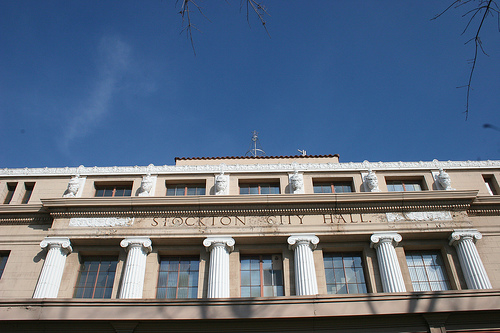While municipal bankruptcies aren’t new, AB 506 is. And while bankruptcy isn’t often used, Stockton’s City Council moved to begin a process that could end in bankruptcy.
“The City is in an immediate and severe fiscal crisis,” said City Manager Bob Deis while recommending the City move forward with bankruptcy. “Absent some negotiated adjustment to the City’s financial obligations, the City will be insolvent and will have no alternative than to seek bankruptcy protection under Chapter 9 of the United States bankruptcy code.”
Mayor Ann Johnson described the decision regarding bankruptcy as “momentous.”
The importance of bankruptcy drew out an overflow crowd that spilled out of the council chambers and to the first floor of City Hall.
“This is the most consequential decision in decades,” said David Renison, President of the San Joaquin Taxpayers Association during public comment. “Unless the city can show citizens a huge payoff, bankruptcy should not be undertaken.”
Specific savings were not discussed at the meeting, but the costs and potential impact of inaction were outlined in detail by the city’s report.
The City faces a mid-year deficit of $15 million and out-year deficits that could be as high as $38 million. These deficits continue to persist despite years of balancing budgets on the backs of the city’s employees and the residents they serve. Most of the staff has had their compensation cut by up to 23 percent. Residents’ services have been slashed or eliminated. Of the 1,886 total employees working in 2008, only 1,424 positions remain. The City’s public safety force has already been reduced by nearly a quarter.
The city has no reserves. Pension and retiree costs are predicted to continue rising – rapidly if CalPERS reduces its assumed return on investments. Further cuts to public safety will increase response times to fires and crimes. Cutting miscellaneous employees would further hamper resident access to services in a timely, efficient, and professional manner.
During the meeting, Deis gave a presentation that further outlined how the city had come to the brink of insolvency. For one, years of gross mismanagement have cost the city millions. In fact, Deis said that he’s, “never seen such poor fiscal management.”
Additionally, the state raids of Vehicle License Fees, Redevelopment Ransom payments, and the cancellation of Redevelopment Agencies all played a role in the city’s condition. The end of redevelopment left the city with millions of dollars of debt service and poor management of the RDA, when it did exist, left the city without sufficient resources to service those payments.
“Redevelopment experienced a 60 percent drop in property taxes, which are a huge part of their funding,” said Deis during a line of questioning from the Council.
But several projects funded by the RDA and City depleted the city’s coffers. These projects were the target of some of the ire of people gathered to comment on the potential bankruptcy.
“We didn’t ask for the Arena, and we didn’t ask for the Hotel,” said one retired city worker. “We didn’t make this mess and we shouldn’t have to suffer for it.” She said that her medical costs have gone up while her pension provides just $22,000 per year.
Deis spelled out four options for the future:
- Cutting more services – This was described as unsafe. Most savings would have to come from public safety, which has already been slashed over the last few years.
- More compensation reductions – “We believe our employees have already born the brunt of our cuts,” said Deis. Cutting further from employees would be unfair and could drive employees away from the city.
- Tax increases – The community has nearly 20% unemployment, which means there is a limited capacity to pay increased taxes. And without correcting the fiscal house in Stockton, it is unlikely people would trust the council with more money.
- Financial restructuring – AB 506 procedures could ultimately lead to restructured debt. Dies said that mediation or bankruptcy has had multiple successes in the private sector and would share the burden among the city’s numerous creditors and provide for a healthier future for the community.
Option four, the procedure spelled out in AB 506, was the recommendation of City Staff and their consultant, Management Partners. Their assessment, however, was that not only did the city have to approve the move towards AB 506, but they had to act immediately.
As the night wore on, tension mounted between City Manager Bob Deis and Councilman Dale Fritchen. At one point, Councilman Fritchen demanded Deis show him greater respect and maintain a certain level of decorum in their dealings with one another.
Members of the public also appeared to lose their cool during the marathon meeting.
“We’re not frightened, we’re mad. Very mad,” said Alan Wagner, the President of the Amalgamated Transit Union Local 276. “I used to think I’d see nothing funnier than ‘The Three Stooges,’ then I watched what happened tonight.”
But despite the pleading of all but one of the speakers during public comment, the Council cast a vote of 6-1 to support the City Manager’s recommendation.
Stockton has begun the AB 506 process and a path that could lead to Chapter 9 bankruptcy.





